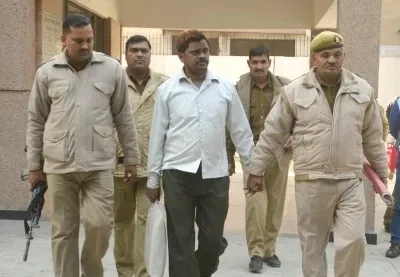Nithari Case: Why Were They Imprisoned If Innocent?

Synopsis
Key Takeaways
- Supreme Court upheld acquittals of Pandher and Koli.
- Victims' families express frustration with the justice system.
- Significant deficiencies in investigation noted.
- Koli remains in prison for another murder.
- The case raises questions about the integrity of law enforcement.
New Delhi, July 31 (NationPress) In a significant development, the Supreme Court has rejected appeals from the Central Bureau of Investigation, the Uttar Pradesh government, and the victims' families contesting the acquittal of Moninder Singh Pandher and Surendra Koli in the notorious 2006 Nithari serial killing case. A heartbroken father has announced he will cease further legal actions.
"If he was truly innocent, why was he imprisoned for so many years? The police officer responsible for his incarceration deserves the death penalty, as does the judge who authorized it. They can acquit him, but justice must be served to the police and the judge," expressed Jhabbulal, whose 10-year-old daughter Jyoti was among the victims.
A bench led by Chief Justice of India B.R. Gavai upheld the 2023 Allahabad High Court decision that overturned the death sentences previously given to Koli in 12 cases and to Pandher in two. The acquittals were attributed to significant deficiencies in the investigation and prosecution processes, prompting the High Court to scrutinize the effectiveness of the investigative agencies.
Despite the Supreme Court's ruling favoring Koli, he remains incarcerated due to a life sentence linked to the 2005 murder of 14-year-old Rimpa Haldar, imposed by the High Court.
Reflecting on his painful journey, Jhabbulal stated, "For a moment, I might accept that Moninder Singh and Koli are innocent. But why were they imprisoned? I have faith in the Supreme Court as the highest authority in the nation, but it raises questions: how can an innocent person be wrongfully imprisoned?"
"Only we understand the truth. Regardless of the court's decisions, we know who committed these crimes, and divine justice will prevail. We will not pursue additional petitions," he concluded.
Jhabbulal's search for his daughter Jyoti lasted over a year and seven months, including visits to brothels in Mumbai and Delhi. His search concluded tragically when skeletal remains and personal items of his daughter were discovered in a drain behind bungalow number D5 in Noida's Nithari village—merely 30 feet from his home.
The location and its residents, Moninder Singh Pandher and his aide Surinder Koli, garnered international media fascination in December 2006 when human remains of at least 19 children and women were unearthed from the property.
Koli received a death sentence from a sessions court in 2009 for the murder of Rimpa Haldar. This verdict was upheld by both the High Court and the Supreme Court in 2011. His execution was postponed following a mercy petition, eventually denied by the President in 2014. However, in January 2015, the Allahabad High Court commuted his death sentence to life in prison due to a delay of over three years in addressing the mercy plea.
Pandher, initially convicted in two cases and acquitted in four, has now been fully acquitted of all six charges against him.










